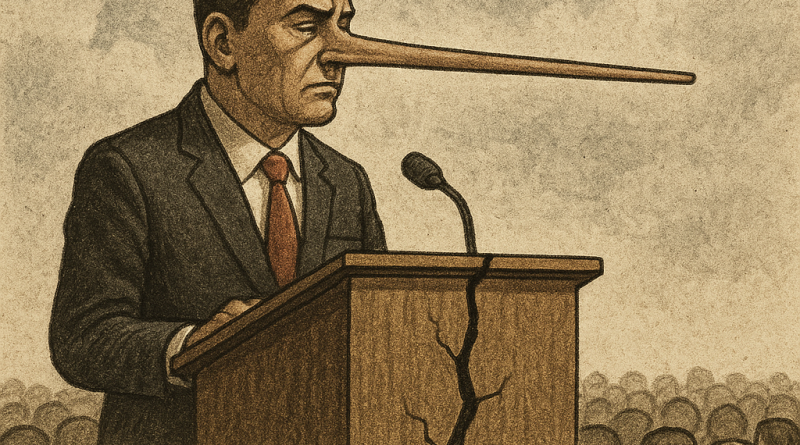The Lie of a Leader, The Collapse of Trust
By Dr. Abdul Wadud Nafis, LC., MEI
In the realm of leadership, honesty is the foundation that determines the direction and fate of a nation. However, when a leader becomes entangled in lies, it is not only their personal integrity that collapses, but also the trust of the people, social stability, and the political order they govern. Lies in leadership are like a subtle poison—not immediately fatal, but gradually destructive.
A leader’s dishonesty has serious consequences from both social and political perspectives. The following outlines the impacts:
1. Social Perspective:
a. Loss of Public Trust
When a leader lies, society loses trust. Once trust is broken, it is extremely difficult to rebuild. This can lead to apathy and social indifference.
b. Damaged Role Model
Leaders are role models. If they lie, society—especially the younger generation—may imitate such behavior. This fosters a permissive culture toward dishonesty.
c. Social Division
Lies can trigger horizontal conflicts within society. For example, falsehoods about certain groups can ignite intergroup tensions, deepening social divides.
2. Political Perspective:
a. Crisis of Legitimacy
Lies weaken political legitimacy. The people feel they are no longer honestly represented, which can lead to calls for resignation, protests, and even coups.
b. Governmental Instability
Governments built on lies will struggle to maintain stability. Non-transparent and manipulative policies breed suspicion and resistance from both the opposition and the public.
c. Erosion of Political Ethics
Dishonesty paves the way for other unethical practices such as corruption, collusion, and nepotism. This erodes the integrity of the political system and undermines democracy.
d. Diplomatic Failure and International Relations Breakdown
In the global arena, leaders known for dishonesty are hard to trust by other national leaders. This can hinder international cooperation and damage a country’s global standing.
Conclusion:
Lying is not merely a moral issue—it has far-reaching implications for societal governance and administration. A dishonest leader not only brings about their own downfall but also dismantles public trust and a healthy political structure. As the saying goes, “Truth may be delayed, but lies will eventually be uncovered.”
Lies may seem beneficial in the short term, but for a leader, they mark the beginning of long-term destruction. True leadership is built on trust, and only honesty can preserve it.
References:
1. Al-Mawardi. (2000). Al-Ahkam al-Sultaniyyah. Beirut: Dar al-Kutub al-Ilmiyyah.
2. Machiavelli, N. (2007). The Prince. New York: Oxford University Press.
3. Nasr, S. H. (2002). Islamic Life and Thought. Chicago: ABC International Group.
4. Wahid, A. (1999). Pribumisasi Islam. Jakarta: LKiS.
5. Weber, M. (2009). Politics as a Vocation. Philadelphia: Fortress Press.
6. Zakaria, F. (2003). The Future of Freedom: Illiberal Democracy at Home and Abroad. New York: W. W. Norton & Company.
7. Qur’an al-Karim. (Translation by the Ministry of Religious Affairs, Republic of Indonesia).
8. Kompas.com. (2024). Public Trust Crisis in Leadership. Retrieved from: https://www.kompas.com



